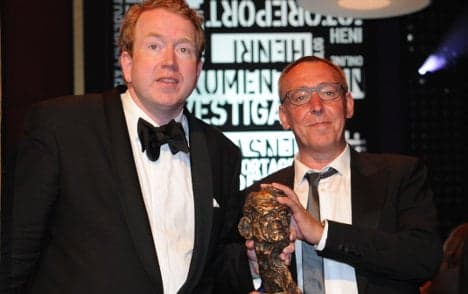<i>Bild</i> award seen as 'alarm signal' by German press

A row exposing fears of a Murdoch-style over-influential tabloid press blew up in Germany at the weekend when reporters from one paper rejected a prestigious prize – because they were set to share it with the populist Bild newspaper.
Three journalists from the Süddeutsche Zeitung broadsheet showed their distaste for Bild journalism during the Friday evening ceremony for the renowned Henri-Nannen prize by refusing their award.
The Bild journalists were due to share the “Best Investigative Achievement” title for their revelations which ultimately led to the resignation of President Christian Wulff. It was the paper’s first such award.
This was described by Süddeutsche Zeitung reporter Hans Leyendecker as a “break with our culture.”
The jury said the category was intended to honour the story with the greatest social impact as well as the best investigation itself.
While Süddeutsche Zeitung journalists had dug deepest to uncover a tax evasion and corruption scandal at Bayern LB Bank, the Bild reporters had made the greatest impact.
Yet the series of stories carried by Bild led to a degree of backlash from other papers and politicians accusing the paper of exerting too much political power and left many in the German media feeling unsettled.
Even the decision to nominate Bild’s for the investigative reporting award had raised a few eyebrows. Writing in the Frankfurter Rundschau newspaper earlier this month, Green politician Antje Vollmer called the nomination an “alarm signal” which threatened to blur the line between “serious journalism and pseudo-journalism.”
Populist publications like Bild wrote Vollmer, were superficially just entertainment, but at their core the whole point of their existence relied on stirring up the “baser instincts in anxious mass societies.”
Leyendecker, together with colleagues Klaus Ott and Nicolas Richter, rejected the jury’s decision to give the prize to both papers, saying he refused to share the award with Bild.
The award ceremony itself was dominated by the row, with the announcement of Bild’s prize greeted with booing from the audience largely made up of Germany’s journalism elite.
Many newspapers and a corresponding section of German society still cling to the idea of a quality press being a crucial part of the social-political structure of the country.
They have been following the unfolding Murdoch scandal in the UK with obvious distaste as it reveals unprecedented levels of media contact with and influence over politicians.
The Local/jlb
Comments
See Also
Three journalists from the Süddeutsche Zeitung broadsheet showed their distaste for Bild journalism during the Friday evening ceremony for the renowned Henri-Nannen prize by refusing their award.
The Bild journalists were due to share the “Best Investigative Achievement” title for their revelations which ultimately led to the resignation of President Christian Wulff. It was the paper’s first such award.
This was described by Süddeutsche Zeitung reporter Hans Leyendecker as a “break with our culture.”
The jury said the category was intended to honour the story with the greatest social impact as well as the best investigation itself.
While Süddeutsche Zeitung journalists had dug deepest to uncover a tax evasion and corruption scandal at Bayern LB Bank, the Bild reporters had made the greatest impact.
Yet the series of stories carried by Bild led to a degree of backlash from other papers and politicians accusing the paper of exerting too much political power and left many in the German media feeling unsettled.
Even the decision to nominate Bild’s for the investigative reporting award had raised a few eyebrows. Writing in the Frankfurter Rundschau newspaper earlier this month, Green politician Antje Vollmer called the nomination an “alarm signal” which threatened to blur the line between “serious journalism and pseudo-journalism.”
Populist publications like Bild wrote Vollmer, were superficially just entertainment, but at their core the whole point of their existence relied on stirring up the “baser instincts in anxious mass societies.”
Leyendecker, together with colleagues Klaus Ott and Nicolas Richter, rejected the jury’s decision to give the prize to both papers, saying he refused to share the award with Bild.
The award ceremony itself was dominated by the row, with the announcement of Bild’s prize greeted with booing from the audience largely made up of Germany’s journalism elite.
Many newspapers and a corresponding section of German society still cling to the idea of a quality press being a crucial part of the social-political structure of the country.
They have been following the unfolding Murdoch scandal in the UK with obvious distaste as it reveals unprecedented levels of media contact with and influence over politicians.
The Local/jlb
Join the conversation in our comments section below. Share your own views and experience and if you have a question or suggestion for our journalists then email us at [email protected].
Please keep comments civil, constructive and on topic – and make sure to read our terms of use before getting involved.
Please log in here to leave a comment.